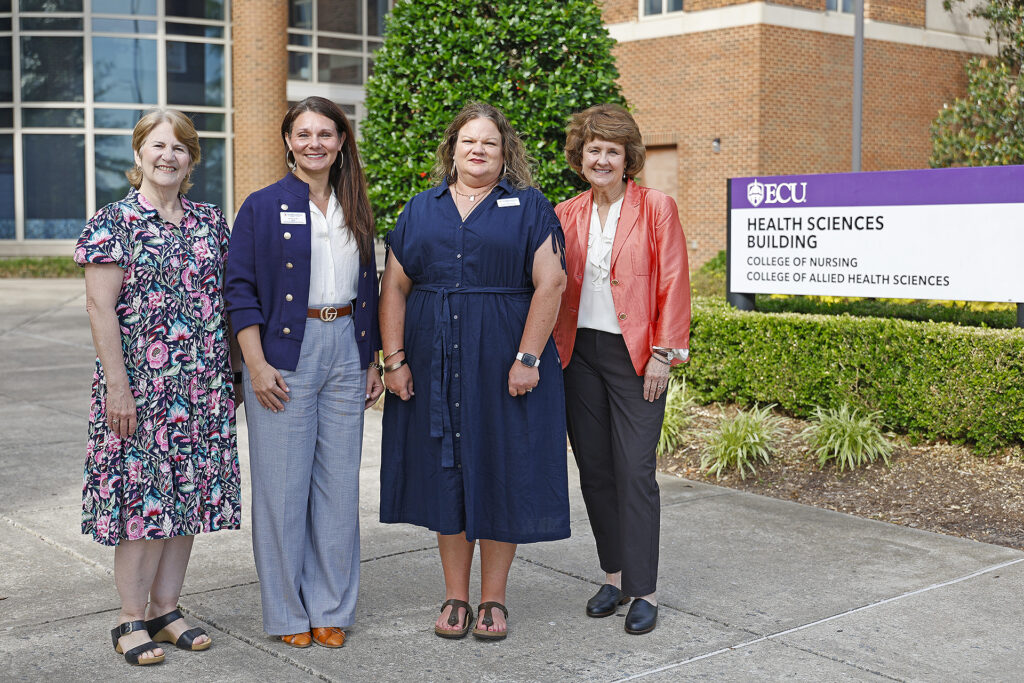SCC partners with ECU to provide ‘smooth and clear transfer’ for MLTs into online bachelor’s program
Southeastern Community College and East Carolina University created a bridge for medical lab technicians to earn their bachelor’s degree in clinical laboratory science. SCC signed an articulation agreement with ECU to make crossing that bridge easier with the MLT-to-MLS Bachelor of Science online degree program.
SCC’s MLT and Phlebotomy Program Director Dawn Williamson and SCC’s Dean of Nursing and Healthcare Training Jessica Hill traveled to ECU on May 8 to meet the faculty, discuss the details and tour the classroom and lab facilities.
“We are proud to have an affiliate agreement with East Carolina University that provides a smooth and clear transfer for our students,” Williamson said. “This opportunity supports continued education and career advancement in a flexible, fully online format.”
The main objectives of this online pathway are to provide MLT graduates with opportunities in clinical lab leadership roles and roles that require a high level of independent judgement with diagnostic test results. Earning a bachelor’s degree leads to higher-paying careers in the clinical laboratory setting or meets the requirement for a master’s degree.
“Southeastern Community College consistently graduates highly skilled MLTs who are eager to take the next step in their careers,” Hill said. “East Carolina University’s online Clinical Laboratory Science program is an excellent fit for these professionals, offering a flexible, high-quality path to advancement in the clinical lab field while allowing them to continue working in their communities.”
Williamson and Hill met with Dr. Guyla Evans, ECU’s Clinical Laboratory Science Program Director and Chair, and Dr. Leigh Cellucci, Professor and Associate Dean for Academic Affairs during their visit to ECU.
Evans explained that this online degree program came about due to the COVID-19 pandemic in 2020. She said that ECU’s Clinical Laboratory Science department put their heads together and figured out a solution to providing lecture-based lab curriculum in an online format.
“For an MLT who is already working, we figured out that we don’t need to teach them technical skills. They’ve already got those,” Evans said. “What we need to be able to deliver is the more advanced theoretical knowledge, and we can certainly do that in an online way.”
The next step in the process was determining which credits transfer and which courses an incoming student needed to take. Evans said the “most obvious win” for an incoming student would be the clinical hours they completed as an MLT student, and she commended Williamson on her MLT program’s clinical hour requirement.
With the R1 status, ECU has the highest level of research excellence that places the university among 5% of institutions in the U.S. that hold the R1 designation. Evans said that MLT graduates would choose ECU for their bachelor’s degree program because of the university’s mission to serve the people of eastern North Carolina and provide better healthcare for the region.
“You come in, and you’re working in a lab and doing beautifully,” Cellucci said. “But you cannot get promoted to a managerial position without having that bachelor’s degree. This program provides yet another door that people can walk through throughout their career. It’s about professional development.”
In the most recent American Society for Clinical Pathology wage and vacancy rate survey, Evans noted that a “shocking number” of Baby Boomers will leave the workforce soon and open up supervisory positions for MLTs working on their bachelor’s degree.
“Like Dr. Cellucci was saying, having that bachelor’s degree moves you along in that career development,” Evans said. “At this level, they can take a national certification exam that demonstrates that they are qualified to perform high complexity testing.”
In addition to the clinical lab coursework, Evans explained that students would need additional classes in the humanities, social sciences, statistics, writing and English courses as prescribed by the university’s academic standards. She said that employers are looking for people with soft skills who can work in diverse situations.
“I think those patterns of thinking are really shaped by those humanities, social sciences and arts courses that are part of that general education foundation,” Evans said. “That’s part of what’s going to set these students up to succeed as a supervisor or manager. Your technical skills aren’t going to help you be a good manager. It’s how you work with people.”
Are you an MLT interested in an online bachelor’s degree through ECU? Contact Dr. Guyla Evans at [email protected] or visit clinicallaboratoryscience.ecu.edu for more information.

